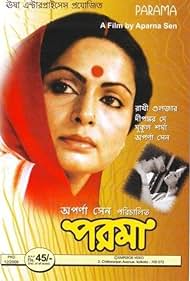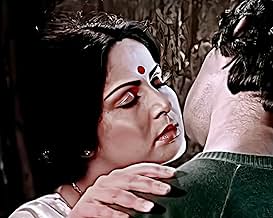A 40-year-old married woman falls in love with a young man.A 40-year-old married woman falls in love with a young man.A 40-year-old married woman falls in love with a young man.
- Awards
- 2 wins
Photos
- Director
- Writer
- All cast & crew
- Production, box office & more at IMDbPro
Storyline
Did you know
- TriviaAparna Sen's husband Mukul Sharma plays the lead role in the film as photographer Rahul.
Featured review
Parama is a housewife in Calcutta whose life is turned upside down when handsome photographer Rahul returns from America and decides to make a photoessay on the traditional Bengali housewife; Parama is chosen as the quintessential example of such. Superficially Parama is fulfilling her traditional role, she is living the bourgeois hoped-for life, running a well-to-do household, her husband is very successful. But we quickly learn that Parama is a shell of herself, taken for granted by her husband, and the artistic part of herself has shrivelled away, she has sleepwalked into self-death.
Rahul helps her to push her boundaries (visualized by a perilous rooftop climb) and to remember her true self. She falls in love. She starts to play the sitar again, and yearns after a beloved plant variety from her childhood, the name of which she has forgotten.
Various adventures and the obligatory incaution that develops in romantic affairs follow.
My favourite memories are of Parama playing the sitar whilst it rains, it is almost like she is creating the raindrops, the scene made my hair stand on air. Also there is a nice visual of the pair of lovers climbing a spiral staircase, spiritually ascending as it were, to their love nest. I note that the plant in the movie is likely different from the genus named. In the movie the plant is referred to as Euphorbia, but Euphorbia are very visually distinguishable by their chartreuse colouration. I think rather that the name is used because of its meaning in ancient greek, "true joy". For Parama, to connect to the world of feelings from her childhood is true joy.
The lesson we are meant to learn is that life is nothing without creativity, autonomy, and without your foundations.
Rahul helps her to push her boundaries (visualized by a perilous rooftop climb) and to remember her true self. She falls in love. She starts to play the sitar again, and yearns after a beloved plant variety from her childhood, the name of which she has forgotten.
Various adventures and the obligatory incaution that develops in romantic affairs follow.
My favourite memories are of Parama playing the sitar whilst it rains, it is almost like she is creating the raindrops, the scene made my hair stand on air. Also there is a nice visual of the pair of lovers climbing a spiral staircase, spiritually ascending as it were, to their love nest. I note that the plant in the movie is likely different from the genus named. In the movie the plant is referred to as Euphorbia, but Euphorbia are very visually distinguishable by their chartreuse colouration. I think rather that the name is used because of its meaning in ancient greek, "true joy". For Parama, to connect to the world of feelings from her childhood is true joy.
The lesson we are meant to learn is that life is nothing without creativity, autonomy, and without your foundations.
- oOgiandujaOo_and_Eddy_Merckx
- Mar 5, 2024
- Permalink
Details
- Release date
- Country of origin
- Languages
- Also known as
- Palabras y música
- Filming locations
- Production company
- See more company credits at IMDbPro
- Runtime2 hours 19 minutes
- Color
Contribute to this page
Suggest an edit or add missing content












